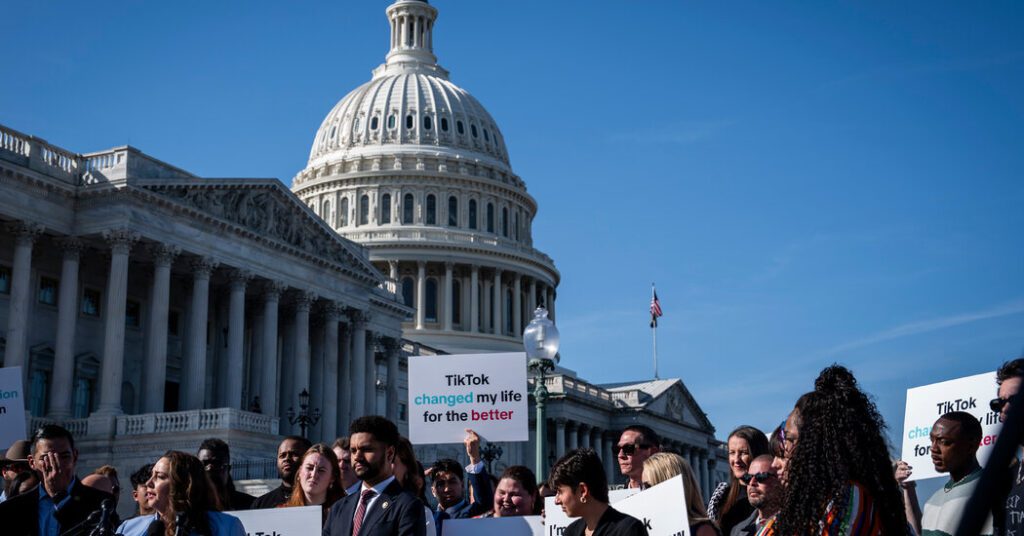TikTok on Thursday detailed why it believes new federal legislation that could lead to a ban of the popular video app in January is unconstitutional, calling the law an “extraordinary restriction on speech.”
The company said Congress had not given sufficient scrutiny and care to the legislation, which would have forced TikTok's Chinese owners to either sell the popular social media app or face being banned in the United States.
TikTok made the argument in a filing with the U.S. Court of Appeals for the District of Columbia Circuit, where it filed a lawsuit in May seeking to block the law.
“This legislation marks a significant departure from our nation's tradition of defending an open internet and sets a dangerous precedent that would allow political parties to target unpopular speech platforms and force them to be sold off or shut down,” the company said in a filing on Thursday.
The company also said it was unclear whether Congress had considered the company's efforts to reach a compromise with the Biden administration.To back up its claims, the company released a trove of documents about numerous classified meetings and other interactions with federal officials, most of which have been shrouded in secrecy.
The new documents include a 90-page proposal from TikTok outlining how the company plans to address concerns raised by U.S. national security officials about the app, including worries that the Chinese government could use it to spread propaganda or collect sensitive data on users.
The Biden administration never approved the company's proposal, known as Project Texas, despite repeated discussions with TikTok.
TikTok also released letters containing dates and details of several meetings the company had last year with members of the secretive committee known as the Committee on Foreign Investment in the United States, or CFIUS.
The new law, which received overwhelming bipartisan support in Congress and was signed by President Biden in April, requires TikTok's parent company, ByteDance, to find a government-approved buyer outside China by mid-January.
The legislation could upend the future of the app, which has 170 million users in the U.S. and touches nearly every aspect of American life.
TikTok sued the government in May, starting a battle that many legal experts say will likely end up in the Supreme Court. The government is scheduled to file supporting briefs in its lawsuit by July 26. Oral arguments in the case are scheduled for September 16.
The U.S. government has shared its most significant national security concerns about TikTok in private forums, including in classified briefings with members of Congress.
The company claims it has made specific commitments to the US government to address its concerns, including allowing third-party monitoring of TikTok's content and “shutdown options” if the company violates the terms of the security agreement.
The allegations shed new light on TikTok's negotiations with CFIUS, a group of federal agencies that review foreign investments in U.S. companies, which have been largely shrouded in secrecy for the past two years.
Before the law was passed, TikTok was in limbo as the committee considered whether to approve its security plan.
The documents show that TikTok's lawyers and the Biden administration have had multiple discussions since at least March 2023 about the feasibility of a sale and whether the company could transfer its underlying code out of China. A few months later, the company gave a presentation at the Treasury Department in which it noted that “the positions of the U.S. and Chinese governments are completely incompatible, putting the company in a difficult position,” according to the documents.
TikTok's last in-person meeting with CFIUS was in September, during which “separate technical discussions” took place about the challenge of transferring its underlying code out of China, according to documents. The company said it has heard little from the administration since then.
After the new law was introduced in March, TikTok's lawyers wrote to Justice Department officials saying the company was concerned “CFIUS is being compromised by political incitement in this matter.”
In a statement, the Justice Department said the bill “addresses serious national security concerns consistent with the First Amendment and other constitutional constraints” and that it looks forward to defending it.
“The Department of Justice, along with intelligence agencies and members of Congress, has consistently warned about the threat of authoritarian states weaponizing technology, such as apps and software that run on our phones, against us,” the statement said. “This threat is compounded when these authoritarian states demand that companies under their control secretly turn over sensitive data to their governments.”

